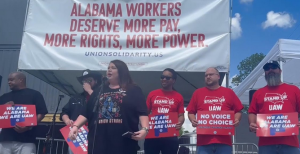By Economic Policy Institute
Photos: EPI\YouTube Screenshots
Last week, more than 4,500 workers at Mercedes-Benz’s plant in Vance, Alabama, voted on whether to organize with the United Auto Workers (UAW). After Mercedes and Republican elected leaders in Alabama waged a vicious anti-union campaign, the workers narrowly voted against the union. While this result shows the power of corporations and state governments to smother worker efforts to unionize, even in defeat the UAW helped Mercedes workers win substantial improvements in pay and benefits. Worker organizing can benefit workers whether or not they end up with a union.

As EPI has long documented, U.S. labor laws are heavily stacked against workers. Evidence suggests that more than 60 million workers wanted to join a union in 2023 but couldn’t do so. Employers spend more than $400 million annually on consultants to oppose worker organizing efforts, and employers are charged with violating the law in more than 40% of all union election campaigns. Many states, including Alabama, have helped employers by passing so-called “right-to-work” (RTW) laws; on average, workers in RTW states are paid 3.2% less than similar workers in non-RTW states, which translates to $1,670 less per year for a full-time worker. RTW laws have always been intended, first and foremost, to prevent workers from successfully organizing.
The workers at the UAW campaign in Alabama experienced a full-court press from the state and the company. In the run-up to the election, Governor Kay Ivey joined five other Southern Republican governors in issuing a statement warning that “unionization would certainly put our states’ jobs in jeopardy.” This was part and parcel with the South’s long history of anti-union efforts motivated by racial animus. READ MORE…







